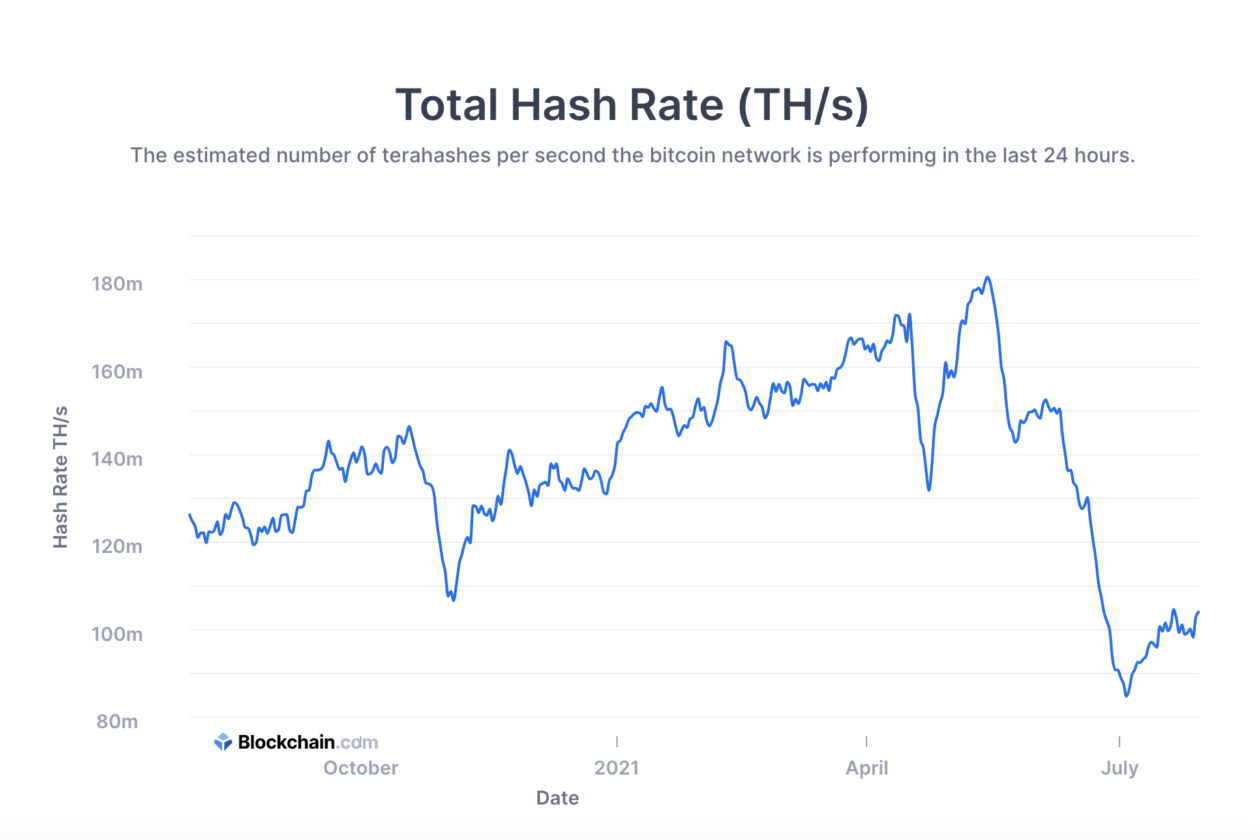Bitcoin miners are expected to be slapped with an increased mining difficulty soon, as the cryptocurrency’s total mining hashrate steadily recovers with Chinese miners gradually making their way back online overseas.
The Bitcoin mining difficulty level is estimated to increase slightly over 5% in the coming weekend after four consecutive declines since May, according to data from BTC.com.
The last adjustment, made on July 18, saw the difficulty drop 4.8% to 13.67 trillion at block height 691,488, making it the lowest difficulty level in about 18 months, the data showed.
Bitcoin mining difficulty is a measure to decipher how hard a miner could “dig out” Bitcoins. The difficulty level would undergo an adjustment every 2,016 blocks, which usually takes about two weeks, and would be affected by the changes in mining hashrate.
When the hashrate increases, the mining difficulty typically follows. That said, the expected mining difficulty increase could be largely due to a recovering hashrate.
The global Bitcoin hashrate has been gradually recovering since July 3, as suggested by data from Blockchain.com. The total hashrate had been nose-diving from mid-May, plunging from 180.67 million terahashes per second — an all-time high — to 84.79 million on July 3, the lowest since September 2019, according to the data.
On Thursday, the hashrate reading was at 104.09 million TH/s.

Meanwhile, the Ethereum network hashrate is also recovering. According to data from BitInfoCharts, the hashrate plummeted to 477.5 TH/s on June 26, from 643.8 on May 20. The reading, nonetheless, is gradually picking up since late June, reaching nearly 555 TH/s on Thursday.
Miners coming back to work
The hashrate moves are considered largely due to the pickup of mining operations out of China. As China intensifies its crackdowns on crypto mining, many miners have shut down their facilities in China and are leaving for other places that appear to be more regulations-friendly and offer relatively cheap electricity.
Some early favorite destinations for displaced Chinese miners include Kazakhstan, North America and Northern Europe.
BIT Mining, for instance, has deployed 3,819 Bitcoin mining machines with a total hashrate capacity of 172 peta hashes per second at data centers in Kazakhstan, according to a statement released Wednesday. Another 4,033 machines are already shipped there and are waiting to go online, the company said.
BIT Mining, formerly known as 500.com, until recently operated online sports lottery services, but the company announced last week that it had decided to dispose of its lottery business. The New York Stock Exchange-listed company appears to be betting big on crypto mining, as it announced earlier this week that it had entered into a purchase agreement to buy 2,500 new Bitcoin mining machines worth approximately US$6.6 million.
Resettling in neighboring nations
Bitmain, a major Chinese mining rig maker, also announced earlier this week that it had joined hands with Enegix, which runs one of the biggest crypto mining data centers in Kazakhstan, to host its Antminer machines in the Central Asian nation.
Bitmain is also helping its clients move their operations out of China. Last month, it called a meeting of crypto mining businesses in Chengdu, the capital of the southwestern province of Sichuan, and said that it was rolling out a “hub” service that could shorten the time required for overseas repairs from three weeks to as little as four days, according to a statement.
Another Chinese rig maker is also sparing no effort to tap into crypto mining. Canaan, one of the world’s biggest crypto mining rig makers, last month launched its own crypto mining business in Kazakhstan. Edward Lu, a senior vice president at Canaan, told Forkast.News at the time that the company was also setting up a service center in Kazakhstan as it was expecting many of its Chinese miner clients to move to that country.
In addition to Kazakhstan, neighboring Russia also beckons. The Russian Association of Cryptoeconomics, Artificial Intelligence and Blockchain, an industry association, recently said it was working with government authorities to launch a project to attract crypto mining operations to the nation. It said the country’s plentiful excess electricity and cold climate could add to the allure.
At least one Chinese company has taken action to do so. The9 Limited, a Nasdaq-listed China-based online game operator that has pivoted its company business to crypto mining earlier this year, announced earlier this month that it had signed a crypto mining hosting agreement through a wholly-owned unit with BitRiver, a Russian crypto mining company.
The9 entered into a two-year contract with BitRiver, in which the Russian firm is set to reserve 15 megawatts of power capacity for The9’s Bitcoin mining machine deployment. Headquartered in Moscow, BitRiver adopts surplus hydroelectric power to operate data centers, and the designated facility for The9’s Bitcoin mining machines has an initial total power supply capacity of 300 megawatts.





